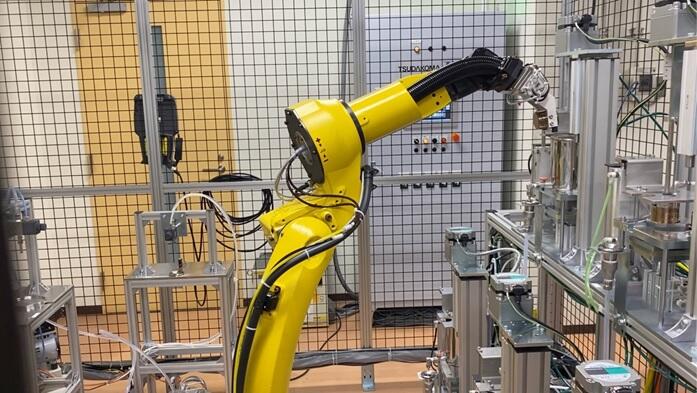On July 5, a research group led by Professor Kenji Takahashi of the Faculty of Biological Science and Technology, Institute of Science and Engineering at Kanazawa University, in collaboration with Tsudakoma Corp. (Kanazawa City, Ishikawa Prefecture; Chairman and President Nobuhiro Takano) announced that they had developed a robotic system for fully automated synthesis of plant-based plastics. Five reactors operating in tandem realized the production of 3,000 different plant-based plastic materials in a year. The results are expected to contribute to constructing a future society based on circular design (aiming for a recycling-oriented society generating no waste) that does not rely on fossil resources.

Provided by Kanazawa University
Previously, the research group established the Center for Co-Creation of Resource Recycling Society by Renewable Polysaccharide Plant-Derived Plastics at Kanazawa University with support from the Program on Open Innovation Platforms for Industry-academia Co-creation (COI-NEXT) operated by JST. The research group conducts research aiming at developing "materials that can be recycled in society," "materials of which more consumption results in a more enriched environment," and "materials that facilitate consumer behavioral changes."
To achieve these aims, developing various materials suited for exit applications is needed. For example, for products that may be released into the environment, such as fertilizer capsules and mulch sheets used in agriculture, biodegradable resins that are easily decomposed by microorganisms to produce fertilizers and nutrients should be developed. Such materials will also help solve the problem of marine microplastics.
For resins used in daily life, materials should be designed to be renewable and recyclable through chemical recycling as they deteriorate, assuming that they are used for a long time through material recycling. Meanwhile, the databases for the physical properties of resins necessary for material development were scarce even for petroleum-derived polymer materials and not available for plant-derived polymer materials.
Therefore, the research group developed a robotic system for the automated synthesis of plant-based resins, which is necessary for the construction of a database of the physical properties of plant-derived materials. The development speed is expected to be accelerated by automating the synthesis of plant-derived resins, a bottleneck step in material development. The robot system developed is capable of synthesizing five samples of plant-derived resins at a time. When operated 2 sets per day, it can synthesize 10 samples per day, or 3,000 samples in a year if operated 300 days per year. Moreover, because the reactions are carried out under homogeneous conditions where cellulose is completely dissolved in ionic liquid, new derivatives can be synthesized while controlling the degree of substitution in esterification.
In conventional chemical modifications of cellulose and other materials, the degree of substitution and other parameters have been difficult to control because reactions are carried out under heterogeneous conditions using carboxylic anhydrides and acid chlorides. Moving forward, the research group will first develop resins using cellulose as the base material, then digitize physical property data of unused agricultural by-products and derivatives, such as proteins, and develop new materials based on machine learning. After physical property assessment, the synthesized resins are registered in the database established by MEXT. The registered data will be useful for performance prediction and designing new functional resins as teaching data for machine learning.
Takahashi said, "Our research is a 10-year project supported by JST COI-NEXT (Program on Open Innovation Platforms for Industry-academia Co-creation). Within that time frame, we hope to synthesize more than 30,000 different plant-based plastics and contribute to solving the current microplastic problem and other issues."
This article has been translated by JST with permission from The Science News Ltd. (https://sci-news.co.jp/). Unauthorized reproduction of the article and photographs is prohibited.




